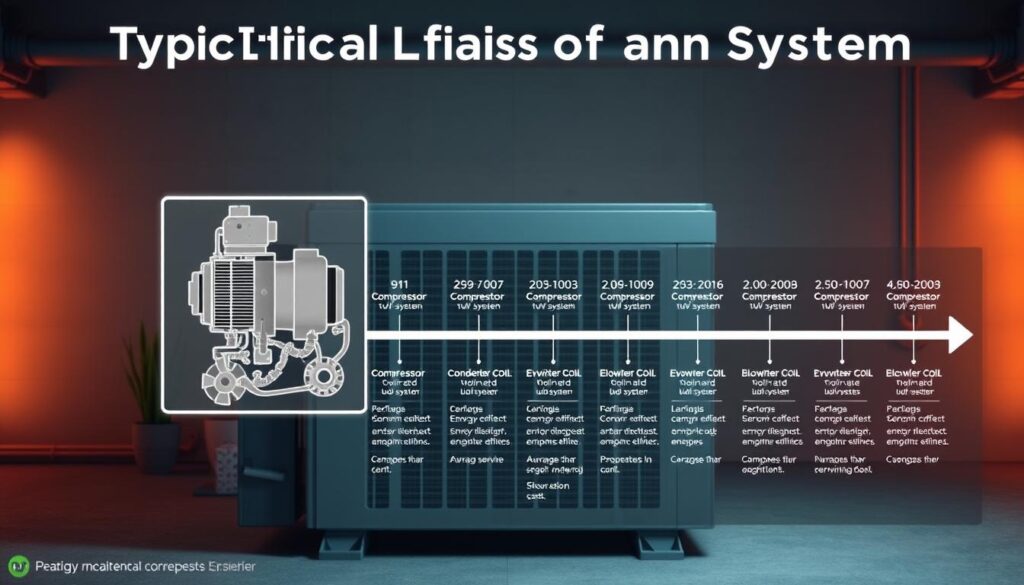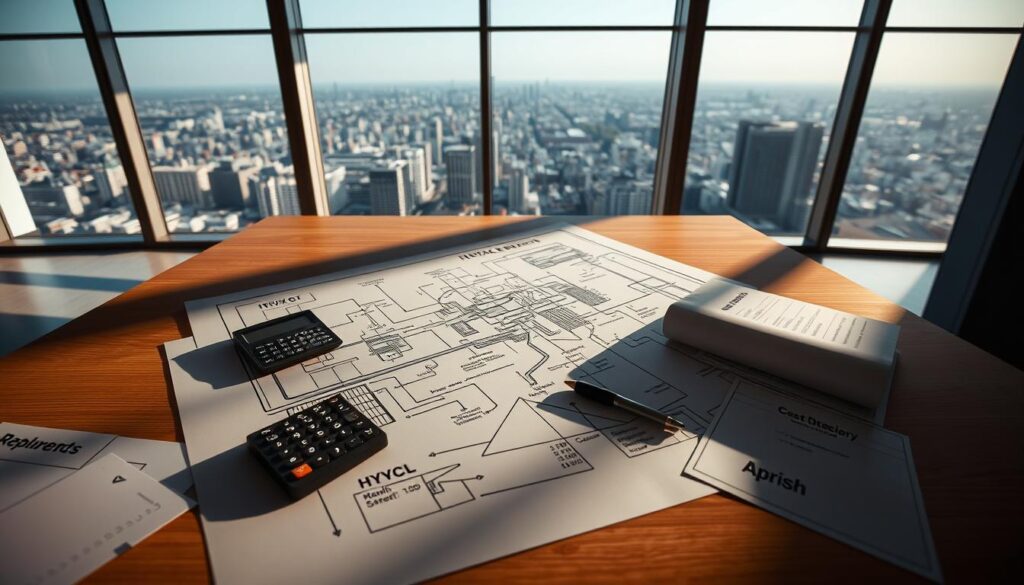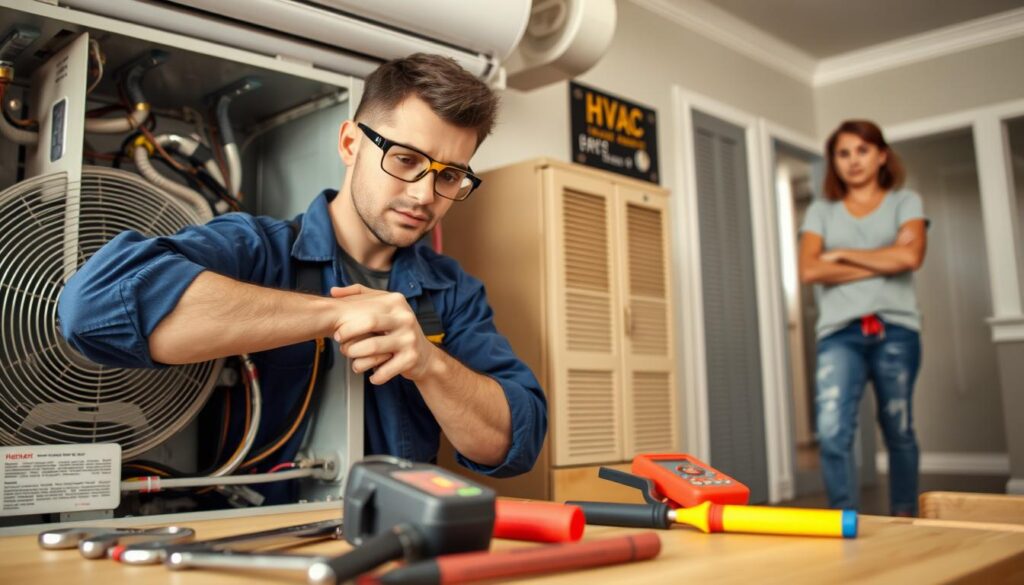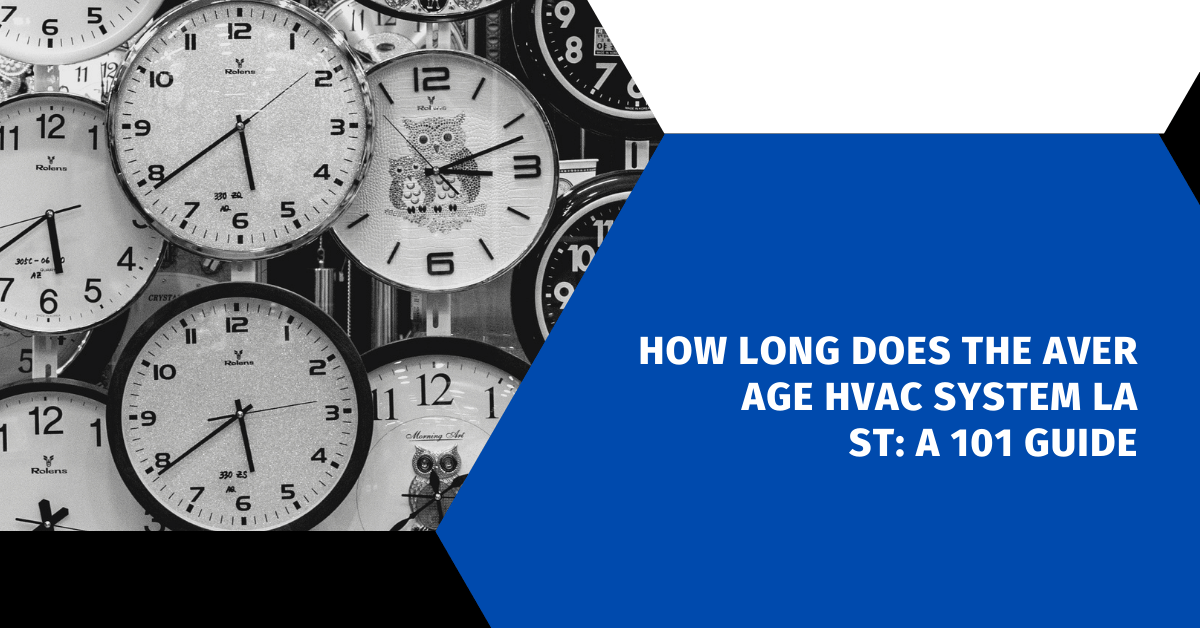Affiliate Disclosure
HVAC Guide Guys is a participant in the Amazon Services LLC Associates Program, an affiliate advertising program designed to provide a means for sites to earn advertising fees by advertising and linking to Amazon.
How Long Does the Average HVAC System Last? Ever thought about how long your HVAC system will keep your home comfy? Knowing how long an HVAC system lasts can save you a lot of money. It also helps avoid uncomfortable moments when the weather gets extreme.

Most modern HVAC systems are built to last 15 to 20 years. But, how long yours lasts depends on a few things. These include how well you maintain it, how often you use it, and the weather around you. So, how long does an average HVAC system really last? It’s not as simple as you might think.
Each part of your HVAC system has its own lifespan. Furnaces usually last 15 to 20 years. Heat pumps can last from 10 to 15 years. And, central air conditioning units can serve you well for 15 to 20 years if you take good care of them.
Key Takeaways
- Average HVAC system lifespan is 15 to 20 years
- Regular maintenance can significantly extend system life
- Different HVAC components have unique lifespans
- Annual professional inspections are key
- Environmental factors impact system longevity
Table of Contents
Understanding HVAC System Lifespans
Your HVAC system is key to home comfort. Its lifespan depends on many factors. Different systems last for varying lengths, affecting your home’s upkeep.
Knowing about HVAC types helps you choose the right heating and cooling for your home. The durability of your system is vital for its long-term performance.
HVAC System Types and Their Lifespans
- Central Air Conditioning Units: 12-17 years
- Heat Pumps: 10-16 years
- Furnaces and Boilers: 15-20 years
- Geothermal Heat Pumps: 25-30 years
- Solar HVAC Systems: 25-30 years
- Evaporative Coolers: 5-15 years
Key Factors Affecting System Longevity
Several important factors affect your HVAC system’s lifespan:
- Maintenance frequency
- Installation quality
- Environmental conditions
- Usage patterns
- System size and efficiency
Component Lifespan Insights
Regular maintenance can extend your system’s life. Experts suggest annual tune-ups and regular filter changes. This helps keep your system running well for longer.
Proper care can add years to your HVAC system’s functional life.
How Long Does the Average HVAC System Last
Knowing how long an HVAC system lasts is key for homeowners. Most systems work well for 15 to 25 years. This depends on several important factors.
Different parts of your HVAC system last different lengths of time:
- Central air units: 12 to 17 years
- Heat pumps: Around 16 years
- Furnaces: 15 to 20 years
How long your system lasts depends on many things:
- Maintenance frequency
- Climate conditions
- Usage patterns
- Installation quality
- Brand reliability
Regular maintenance can make your system last longer. Experts say to get service at least once a year. This keeps your system running well and catches problems early.
Proactive maintenance is key to maximizing your HVAC system’s lifespan and efficiency.
While most HVAC systems last 15 to 25 years, experiences can vary. Keeping an eye on your system and fixing maintenance issues quickly can prevent big problems. It also saves you from expensive replacements.
Explore Our HVAC Shop
Looking for top-rated HVAC tools, parts, and accessories? Visit our shop and find the perfect solution for your needs.
Visit the ShopSigns Your HVAC System Needs Replacement
Knowing when your HVAC system is getting old can save you money and avoid sudden breakdowns. Spotting the warning signs helps you decide if it’s time for a new system.
Your home’s comfort and energy use depend on a good HVAC system. Look out for these signs that it might be time for a new one:
Rising Energy Bills
Higher energy bills can mean your HVAC system is aging. Older systems use more energy to keep your home comfortable. Watch for these signs:
- Monthly utility bills that keep going up
- Energy costs rising by more than 20% each year
- The system taking longer to cool or heat your home
Frequent Repair Needs
Need to fix your HVAC system a lot? It’s a sign it’s not working well. The “$5,000 rule” can guide your decision:
| System Age | Repair Cost | Total Cost | Recommendation |
|---|---|---|---|
| 10 years | $600 | $6,000 | Consider Replacement |
| 15 years | $800 | $12,000 | Replace Immediately |
Unusual Noises and Odors
Strange sounds or smells from your HVAC system mean big problems. Watch out for these signs:
- Loud banging or grinding noises
- Musty or burning odors
- Inconsistent airflow
- Excessive dust or humidity
By keeping an eye on these signs, you can keep your HVAC system running well. This helps you make the best choice about upgrading or replacing it.
Essential HVAC Maintenance Tips
Keeping your HVAC system in top shape is key. It ensures your system works well and lasts longer. Regular maintenance boosts energy efficiency and saves you from expensive fixes.
Homeowners can do several important tasks to keep their HVAC system running right:
- Change air filters monthly to prevent airflow restrictions
- Clean outdoor unit regularly to remove debris and vegetation
- Schedule professional annual tune-ups
- Check refrigerant levels
- Inspect ductwork for possible leaks
Your HVAC system’s performance depends on regular care. A well-maintained system can cut energy bills by up to 15%. Simple steps like cleaning air filters ease the load on your equipment and boost performance.
“Preventative maintenance is the key to long-lasting HVAC performance” – HVAC Professional Association
Make a maintenance plan that includes DIY tasks and professional checks. This way, you catch problems early and avoid costly repairs. It also makes your system last longer.
Energy Star says to check air filters monthly and get professional help twice a year. By doing routine maintenance, you’ll make your HVAC system more efficient and reliable.
Explore Our HVAC Shop
Looking for top-rated HVAC tools, parts, and accessories? Visit our shop and find the perfect solution for your needs.
Visit the ShopThe Impact of Climate and Usage on HVAC Longevity
Your HVAC system’s lifespan is greatly affected by climate and how you use it. Knowing these factors can help you get the most out of your system and make it last longer.
Different weather conditions can really stress your heating and cooling system. Extreme temperatures and humidity levels are key in how long your system works well.
Weather Conditions and System Stress
Certain weather traits really impact how well your HVAC works:
- Coastal areas can shorten system life by 5-10 years because of salt damage
- Very hot or cold weather speeds up wear and tear
- High humidity can make parts wear out faster
Seasonal Usage Patterns
Your HVAC system works a lot harder in summer and winter. Running it a lot during these times can make it age faster. Places with really hot or cold weather for longer periods will see their systems wear out quicker.
Usage Impact on System Longevity
How you use your HVAC affects how long it lasts. Running it a lot or changing the temperature a lot can stress it out. Using it wisely can help it work better and last longer.
Proper maintenance and smart usage can extend your HVAC system’s life by years.
Regular upkeep, professional checks, and smart usage can make your HVAC system work better and last longer.
Explore Our HVAC Shop
Looking for top-rated HVAC tools, parts, and accessories? Visit our shop and find the perfect solution for your needs.
Visit the ShopCost Considerations for HVAC Replacement

When planning to replace your HVAC, think about the cost. The lifespan of an HVAC system is 10 to 20 years, based on how well you maintain it. In 2024, expect to spend between $5,000 and $12,500 for a new system.
Consider these financial points when upgrading your HVAC:
- Initial system cost ($5,000 – $8,000 for standard units)
- Energy efficiency ratings
- Potential long-term savings
- Installation complexity
Different HVAC systems have different prices:
- Central air conditioners: $4,000 – $8,000
- Heat pumps: $5,000 – $10,000
- Ductless mini-split systems: $2,000 – $4,000 per unit
Remember the 5,000 rule. If repair costs times the system’s age is over $5,000, it’s cheaper to replace it. Labor costs are $50 to $100 an hour, adding to the total cost.
Upgrading to energy-efficient systems can save money in the long run. Look for systems with SEER ratings of 14 or higher. This can also help you get tax credits, making the initial cost lower.
Modern HVAC Technology and Lifespan Improvements
HVAC technology is changing fast, making home comfort systems better. New advancements are changing how we think about energy efficiency and upgrading HVAC systems.
New innovations are making systems last longer and use less energy. Variable-speed motors now control temperature better, using less electricity.
- Smart thermostats can reduce energy consumption by up to 15%
- Zoning systems provide targeted cooling and heating
- New refrigerants minimize environmental impact
Heat pumps are a big step forward in home climate control. Energy savings of 30% to 60% can be achieved with these systems. The latest models are eco-friendly and very efficient.
The future of HVAC is intelligent, efficient, and sustainable.
When thinking about upgrading, look for systems with high SEER ratings. A SEER rating of 16 or above means the unit is very efficient. This can lower your energy bills and make your system last longer.
New technologies are making home comfort systems smarter and more eco-friendly. By choosing modern HVAC technology, you’re not just making your home more comfortable. You’re also helping the planet.
Explore Our HVAC Shop
Looking for top-rated HVAC tools, parts, and accessories? Visit our shop and find the perfect solution for your needs.
Visit the ShopProfessional Maintenance vs. DIY Care
Keeping your HVAC system running well is key. A mix of professional help and DIY efforts can greatly improve its performance and life span.

Getting regular maintenance from pros is vital. They can spot problems early, saving you from big repair bills and keeping your system running smoothly.
Professional Service Benefits
- Comprehensive system diagnostic checks
- Precision tune-ups that maximize energy efficiency
- Early detection of possible mechanical failures
- Warranty protection for important parts
DIY Maintenance Tasks
Homeowners can also help their HVAC system stay healthy. Here are some tasks you can do:
- Change the air filter every month
- Clean around the outdoor unit
- Check if the thermostat is working right
- Look for leaks in the ductwork
Maintenance Schedule Planning
| Maintenance Type | Frequency | Impact on HVAC System |
|---|---|---|
| Professional Inspection | Annually | Extends system lifespan by 30-50% |
| Filter Replacement | Every 1-3 months | Improves efficiency by 20% |
| Duct Cleaning | Every 3-5 years | Reduces operational strain |
“The number one thing you can do is have somebody come out every year to service that unit,” says HVAC expert Mark Goranson.
Regular maintenance stops small problems from turning into big, costly repairs. By combining professional help with your own DIY efforts, you’ll get the most out of your system and extend its hvac system lifespan.
Environmental Factors and System Efficiency
Your HVAC system’s performance is greatly influenced by the environment. Various environmental factors can impact how efficient and durable your system is. This affects how well it works and how long it lasts.
Several key environmental elements can influence your HVAC system’s efficiency:
- Direct sunlight exposure
- Local humidity levels
- Air quality
- Surrounding landscape
- Home insulation quality
Sunlight is very important for your system’s performance. Sudden changes in shade or sun exposure can greatly affect your HVAC unit’s cooling and heating. For example, if trees are removed near your home, your system might struggle to keep temperatures comfortable.
Humidity is also key. High humidity makes your air conditioning work harder, reducing its efficiency and potentially shortening its lifespan. On the other hand, dry environments might put less strain on your system.
Strategic home improvements can help with environmental challenges:
- Plant shade trees near your HVAC unit
- Improve home insulation
- Use window treatments to reduce direct sunlight
- Maintain good air quality with regular filtration
By understanding and adapting to environmental factors, you can make your HVAC system more efficient. This can also extend its operational life.
Explore Our HVAC Shop
Looking for top-rated HVAC tools, parts, and accessories? Visit our shop and find the perfect solution for your needs.
Visit the ShopChoosing the Right HVAC System for Longevity
Choosing the right HVAC system is more than just looking at the price. You need to think about how it will perform over time. This means looking at more than just the cost.
When you’re looking at HVAC systems, there are a few key things to check:
- HVAC energy efficiency ratings
- System compatibility with your home’s layout
- Local climate requirements
- Professional installation quality
Good brands usually make systems that last longer. Most HVAC systems for homes last between 10 to 25 years. This depends on how well you take care of it and how it’s installed.
Electric air-source heat pumps are a great choice. They use up to one-third less energy than older systems.
Getting a professional to install your system is very important. They know how to set it up right. This means it won’t work too hard and won’t break down too soon.
Invest in quality installation from licensed professionals who specialize in specific HVAC brands.
Cost is also a big factor. Even though high-efficiency systems might cost more at first, they save you money in the long run. They use less energy. Many utility companies give rebates for these upgrades, making them a better deal.
Conclusion
Understanding how long an HVAC system lasts can be tricky. But, knowing the basics can help you keep your system running well for a long time. Most HVAC systems last between 15 to 25 years. This depends on how well you maintain it, how often you use it, and the environment it’s in.
Regular maintenance is key to making your HVAC system last longer. Getting it checked every year, fixing problems quickly, and changing filters often can really help. If you take good care of your system, it might even last longer than expected.
Things like the climate, how you use your system, and its size also matter. Systems in tough environments or used a lot will wear out faster. Paying attention to signs like high energy bills, strange noises, or weak airflow can help you catch problems early.
Your HVAC system is a big investment in your home. Knowing how to take care of it, keeping an eye on its performance, and being ready for replacements can save you money. It also keeps your home comfortable for years to come.

